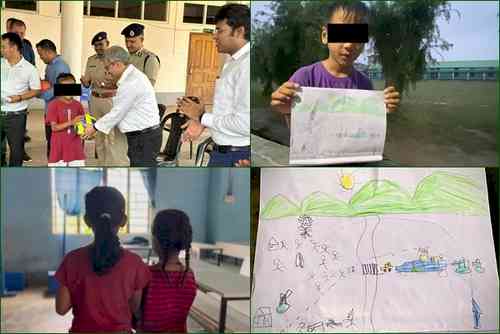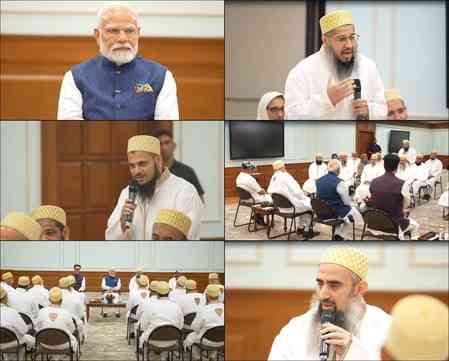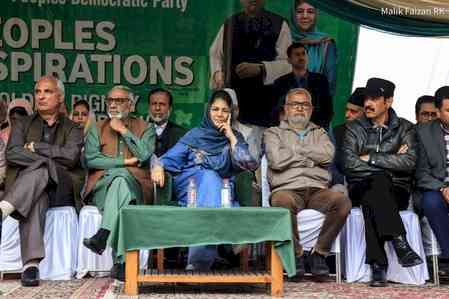Thousands of displaced children living under the shadow ethnic conflict in Manipur
Around 12,700 children are living with their displaced parents and guardians in relief camps across ethnic violence-hit Manipur, officials said here on Friday.

Sujit Chakraborty
Imphal, Sep 1 (IANS) Around 12,700 children are living with their displaced parents and guardians in relief camps across ethnic violence-hit Manipur, officials said here on Friday.
The officials of the Social Welfare Department, who compiled data on children staying in different relief camps, said that out of around 12,700 children, 100 are severely traumatised needing professional counselling.
The Director of the Social Welfare Department, Ngangom Uttam Singh, said: “A child may not get traumatised immediately. But that trauma can come up after one week or even a month. Whenever our teams visiting the camps find such severely traumatised children, they identify them and take them to professional counselors.
"We’ve done this for little more than 100 children. We hope that this number does not increase and these traumatised children become normal very soon.”
To address the mental health issues of the displaced children, counselors are deployed through the District Children Protection Office in every district.
They visit children’s homes and relief camps to give counselling and to identify children who actually require professional help.
The department has a team of qualified medical practitioners and child psychiatrists working as volunteers who aid in providing professional counselling to those who are severely traumatised, Singh said.
Child psychiatrist Jina Heigrujam, who has visited several relief camps to identify children having post-traumatic stress disorder (PTSD), explained why professional counselling is essential to avoid a myriad of mental health issues.
According to Heigrujam, art and dance therapies are the best techniques that work well with children to get them out of their traumatic experience.
“If the stress is prolonged and the child isn’t able to adjust to it, a myriad of mental health issues can come out of it. The most common is post-traumatic stress disorder or depression in childhood or anxiety.
"In order to help them, we’ve to dive deep into the layers to understand how badly they are affected. There are many techniques to do this. One that works well with children is art therapy,” Heigrujam said.
Field visits were conducted by the field officers of the Social Welfare Department to identify stress-affected children at the relief camps at Wangjing in Thoubal district.
These functionaries have been trained to screen for severely traumatised children by a team of resource persons from the National Institute of Mental Health and Neuro-Sciences (NIMHANS), Bengaluru.
The field officers visiting the relief camps employ ‘play and dance’ methods to identify stress-affected children.
At the Lamding relief camp in Wangjing, where internally displaced residents of Moreh and Serou are sheltered, the specialists identified 3-year-old Yaiphaba (name changed) as a traumatised child.
Unlike other children of his age, Yaiphaba refused to join in the group activities.
“He was visibly frightened and clinged on to his aunt. Even luring him with toys and colour pencils did not work. He tightened his hold on his aunt as if sensing danger. All this while, the other kids in the camp were dancing to a happy tune, following the steps of the child specialists,” an official said.
He said that Yaiphaba eased a little when his mother arrived and held him. Gradually, he got drawn to the general mood of fun and frolic and danced to peppy beats.
According to Yaiphaba’s mother, there was turmoil in their house on the night of May 3 at Moreh when 50-60 people from the locality rushed into their house to take shelter after arson struck the locality, burning selective shops and houses.
The upheaval at home affected young Yaiphaba.
“Before the incident, he wasn’t afraid of people but after the incident, whenever there are gatherings of people, especially of strangers, he keeps saying that he is afraid. He has also become reluctant to speak out,” said Yaiphaba’s worried mother.
Coincidentally, the day when the Social Welfare Department officials visited the relief camp happened to be Yaiphaba's third birthday.
So, a birthday cake was ordered. Birthday caps were distributed. The children along with the functionaries sang the 'happy birthday' song for Yaiphaba and as if on cue, the birthday boy happily blew out the three candles.
Then the whole group continued dancing to the beat of a popular Manipuri song – 'Bullet, Bullet, Bullet, Bullet, Nongmai Bullet, Nangna Eihakki'.
At the Lamding camp, the case of 11-year-old Tomthin (name changed), who hails from the border town of Moreh, is unique and reveals a deep sense of anger and revenge motive.
“When he was asked to draw something, he drew the sketch of an armed miscreant. When asked who he was and why he (Tomthin) drew it, he said 'it is the enemy. When I’m done with it, I shall paste it on the wall and then tear it up into pieces with a pencil. When I do that, I will feel relieved because they burnt our house',” a visiting official said.
Another cause of concern that the Social Welfare Department is looking to address is the status of the relief camps. As the relief camps are unplanned and set up on a need basis, a UNICEF team, which visited the state, provided a blueprint for setting up children-friendly relief camps.
The department is looking into this crucial need.
Director Singh added that to overcome the shortfalls in the relief camps, review meetings are held at the chief secretary’s level every week.
The department is also actively monitoring severely malnourished children who are sent to the state-run Jawaharlal Nehru Institute of Medical Sciences in Imphal.
So far, 16 children have been treated for severe malnourishment.
Manipur Chief Secretary Vineet Joshi and his subordinate officials have been visiting the relief camps in both the hill and valley districts to take stock of the conditions of children sheltered there.
Over 170 people have been killed and more than 700 injured since ethnic violence broke out in the state on May 3, after a 'Tribal Solidarity March' was organised in the hill districts to protest against the Meitei community's demand for Scheduled Tribe (ST) status.
Since the outbreak of violence, approximately 70,000 men, women and children belonging to different communities have been displaced and are now sheltered in 350 relief camps set up in schools, government buildings and auditoriums in Manipur as well as in the neighbouring states, including Mizoram.
(Sujit Chakraborty can be contacted at [email protected])


 IANS
IANS 








